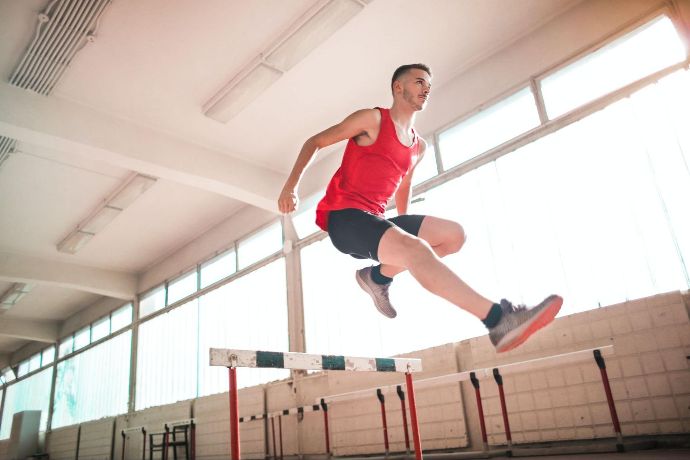The most common nutritional deficiencies in athletes

Optimal athletic performance requires meeting increased nutritional needs compared to the general population. However, studies show many athletes still suffer from deficiencies in key nutrients like iron, calcium, vitamin D, antioxidants, and B vitamins. This increases their risk of fatigue, impaired training adaptations, injury, and illness. Monitoring nutritional status and implementing dietary strategies to prevent deficiencies are essential for long-term health and performance.
Key Takeaways
Iron deficiency is widespread in athletes and negatively impacts performance. Female athletes are at the highest risk.
Low ferritin indicates depleted iron stores. Hemoglobin and transferrin saturation are also valuable markers for screening.
Oral iron supplementation and iron-rich foods can help restore iron levels if deficient. Intravenous iron is an option for severe cases.
Inadequate calcium intake combined with heavy sweating increases stress fracture risk in athletes.
Vitamin D deficiency impairs bone health, immunity, and muscle function. Target blood levels are 40-60 ng/mL.
Deficiencies in B vitamins, antioxidants, zinc, and magnesium may also impair performance. Monitoring status is essential.
Iron Deficiency
Iron is critical in oxygen transport, energy production, and immune function. The increased demand, elevated losses, and suboptimal intake associated with heavy training predispose athletes to iron deficiency.
Causes and Risk Factors
Several mechanisms lead to iron deficiency in athletes:
Heavy sweating results in iron losses up to 2 mg daily.
Gastrointestinal bleeding and intravascular hemolysis during intense exercise.
Inadequate dietary iron intake is common, especially in calorie-restricted diets.
Rapid growth in adolescent athletes increases iron needs.
Those most at risk include:
Female athletes - Due to menstruation and lower energy intake.
Distance runners - Greater hemolysis from foot strike.
Vegetarian/vegan athletes - Decreased bioavailable iron from plant sources.
Signs, Symptoms and Health Impact
Iron deficiency causes fatigue, impaired endurance capacity, and slow recovery from exercise. It also compromises immunity and thyroid function. Without treatment, it can progress to iron deficiency anemia, indicated by:
Pallor
Dizziness
Shortness of breath
Heart palpitations
Headache
Brittle nails
Swollen tongue
Severe iron deficiency impairs oxygen transport and aerobic performance. Even mild lack without anemia negatively impacts endurance and strength.
Assessment of Iron Status
Key lab tests to diagnose iron deficiency include:
Serum ferritin - Levels below 30 μg/L indicate depleted iron stores.
Hemoglobin - Low levels indicate anemia.
Transferrin saturation (TSAT) - Values below 16% suggest iron deficiency.
Repeated screening of at-risk athletes is recommended to catch deficiencies early before performance is impacted.
Calcium Deficiency
Adequate calcium is essential for bone health, muscle contractions, nerve transmission, and enzyme functions. However, heavy sweating, restricted eating, and low dairy intake put athletes at risk for suboptimal calcium status.
Causes and Risk Factors
Athletes are prone to low calcium intake and negative calcium balance due to:
Disordered eating behaviors and calorie restriction
Limited dairy product intake - Main dietary calcium source
Heavy sweating - Losses up to 400 mg per hour
Inadequate vitamin D status - Impairs calcium absorption
Female athletes with amenorrhea have an increased risk due to estrogen deficiency.
Signs, Symptoms and Health Impact
Deficiency can cause muscle cramps, stress fractures, and osteopenia over time.
Signs of acute hypocalcemia include:
Muscle spasms, cramps, or tetany
Tingling lips or fingers
Confusion
Chronic deficiency increases the risk of stress fractures and osteoporosis later in life.
Assessment of Calcium Status
24-hour urine calcium level
Bone mineral density testing
Dietary intake via food logs
Athletes should aim for 1000-1500 mg of calcium daily from dairy, leafy greens, legumes, nuts, and fortified foods.
Vitamin D Deficiency
Vitamin D aids calcium absorption and bone health. However, inadequate sun exposure and intake put athletes at risk for deficiency.
Causes and Risk Factors
Athletes are prone to vitamin D deficiency due to the following:
Indoor training and sun avoidance
Use of sunscreen
Inadequate dietary sources like fatty fish, egg yolks, and fortified foods
Darker skin pigmentation
Rates are higher in the winter at northern latitudes.
Signs, Symptoms and Health Impact
Deficiency can cause muscle weakness, bone pain, and frequent illness or injury. Chronic deficiency increases stress fracture risk and impairs muscle strength and performance.
Assessment of Vitamin D Status
Serum 25(OH)D level - Deficiency is below 30 ng/mL
Dietary intake via food logs
Sun exposure habits
Target 25(OH)D levels for athletes are 40-60 ng/mL. Meeting the RDA of 600 IU daily from food alone is unlikely to achieve sufficiency.
B Vitamin Deficiencies
B vitamins like folate, B12, and B6 play key roles in energy production from carbohydrates, proteins, and fats. Inadequate intake is common among athletes.
Causes and Risk Factors
Athletes are at risk for B vitamin deficiencies due to:
Calorie restriction or disordered eating
Elimination of animal products - Main dietary sources
Increased utilization for energy production during exercise
Female athletes are particularly susceptible due to lower energy intakes.
Signs, Symptoms and Health Impact
Deficiencies can cause fatigue, impaired performance, anemia, muscle weakness, and depression.
Specifically, folate and B12 deficiency cause megaloblastic anemia, while B6 deficiency may impair glycogen utilization.
Assessment of B Vitamin Status
Key markers include:
Serum or red blood cell folate
Plasma B12
Plasma pyridoxal 5’-phosphate (PLP) for B6
Athletes should aim to meet the RDA for their age and gender through food sources and supplementation if needed.
Other Key Micronutrient Deficiencies

While less common than the deficiencies described above, athletes may also have a suboptimal intake of antioxidants like vitamin C, E, and selenium, as well as magnesium and zinc.
Heavy training increases antioxidant needs. Low magnesium status is associated with muscle cramps. Zinc supports immunity and wound healing. Vegetarian athletes are at particular risk for these deficiencies.
Monitoring intake via food logs and supplement use is recommended to prevent insufficiencies.
Preventing Nutrient Deficiencies
Nutritional deficiencies can impair health and performance over time.
Several strategies can help athletes maintain optimal micronutrient status:
Dietary Strategies
Eat a well-balanced diet high in fruits, vegetables, lean proteins, dairy, nuts, seeds and whole grains.
Minimize processed foods and sweets.
Meet calorie needs to support training demands.
Consume iron-rich foods like red meat, poultry, seafood, beans, spinach, and iron-fortified cereals.
Choose calcium-rich foods, including dairy, leafy greens, almonds, and calcium-set tofu.
Increase vitamin D intake with fatty fish, egg yolks, fortified dairy and juice, and mushrooms exposed to UV light.
Ensure adequate B vitamin intake by including animal products, whole grains, nuts, legumes, and green leafy vegetables.
Routine Blood Testing
Test serum ferritin, hemoglobin, transferrin saturation, and CRP at least twice yearly.
Assess vitamin D status via serum 25(OH)D at least once yearly.
Check other nutrients like B vitamins if deficiency is suspected.
Supplementation
Take a daily multivitamin/mineral supplement providing at least 100% DV for B vitamins and antioxidants.
Supplement with iron if ferritin is below 30 μg/L. Take 30-60 mg of elemental iron daily.
Correct vitamin D insufficiency with 2000 IU vitamin D3 per day during winter months or year-round.
Increase calcium intake to 1000-1500 mg daily through food and supplements if needed.
Nutrition Counseling
Consulting with a sports dietitian can help identify potential deficiencies and implement individualized dietary recommendations based on training load, body composition goals, food preferences, and supplement use.
Health Complications of Nutrient Deficiencies
If left untreated, the cumulative effects of nutritional deficiencies can lead to serious health consequences affecting multiple body systems.
Bone Health
Chronic deficiencies in calcium and vitamin D impair bone mineralization, increasing the risk for:
Stress fractures
Osteopenia
Osteoporosis and associated fractures later in life
An estimated 60% of female athletes have bone loss, putting them at high risk for fractures and impaired performance.
Immune Function
Zinc, vitamin D, iron, selenium, and magnesium deficiency compromise immune cell function, increasing the risk of illness and infection.
Illness can interrupt training consistency and performance. Upper respiratory tract infections are more frequent in vitamin D-deficient athletes.
Energy Production
Suboptimal B vitamin status impairs energy production pathways, reducing aerobic capacity.
Iron deficiency limits oxygen transport and delivery to muscles, also decreasing endurance.
Neurologic Function
Iron, B vitamins, magnesium, and vitamin D deficiency may cause symptoms like fatigue, depression, and impaired cognition/focus.
This negatively impacts motivation, concentration, and coordination during training.
Endocrine System
Low energy availability alters hormone levels, including thyroid hormones. Deficiencies in iron and vitamin D also disrupt thyroid function.
Thyroid dysfunction causes metabolic changes that can impair performance and recovery.
Cardiovascular Health
Iron deficiency causes reduced oxygen-carrying capacity. This stresses the cardiovascular system and limits VO2 max.
B vitamin deficiencies are linked to elevated homocysteine levels, a risk factor for cardiovascular disease.
Conclusion
While increased training demands raise nutritional needs for athletes, suboptimal dietary intake and absorption put them at risk for multiple micronutrient deficiencies.
Deficiencies in iron, calcium, vitamin D, B vitamins, and antioxidants are prevalent. Even mild deficiencies without overt symptoms can negatively impact health and performance over time.
Implementing dietary strategies, routine blood testing, and individualized supplementation under the guidance of sports dietitians can help athletes maintain optimal nutritional status.
Ensuring adequate intake of essential micronutrients enables athletes to train consistently at a high level while reducing the risk of chronic diseases and injuries.
References
FAQs
Q: How can I tell if I'm deficient in iron or vitamin D?
Get blood tests for serum ferritin and 25(OH)D levels. Ferritin below 30 μg/L indicates iron deficiency. Vitamin D below 30-40 ng/mL is considered deficient.
Q: What are the best food sources of calcium for athletes?
Dairy products like milk, yogurt, and cheese are excellent sources. Leafy greens, soy milk, almonds, beans, and fortified orange juice also provide calcium.
Q: Is a multivitamin enough to prevent deficiencies in athletes?
A daily multivitamin helps ensure baseline intake for most micronutrients. However, athletes may need additional iron, calcium, vitamin D, and antioxidant supplementation based on individual deficiencies.
Q: How often should athletes get bloodwork to check for nutritional deficiencies?
Check ferritin, hemoglobin, and vitamin D at least twice per year. More frequent monitoring helps detect deficiencies early before affecting performance.
Q: What supplements do an athlete need if following a vegan diet?
Vegans should supplement with B12, iron, zinc, calcium, vitamin D, and possibly protein powder to meet higher nutritional needs from training. Consult a dietitian.







![[FBAB] Hammer Vegan Energy Bar (Almond - Raisin, (12 x 1) BOX)](/web/image/product.product/1285/image_256)
![[FBBB] Hammer Vegan Energy Bar (Cranberry, (12 x 1) BOX)](/web/image/product.product/1172/image_256)